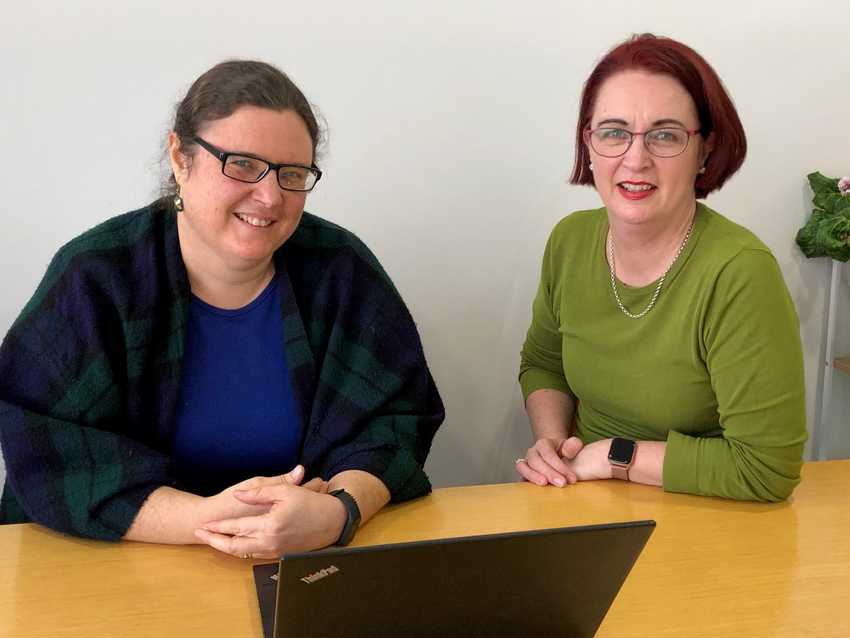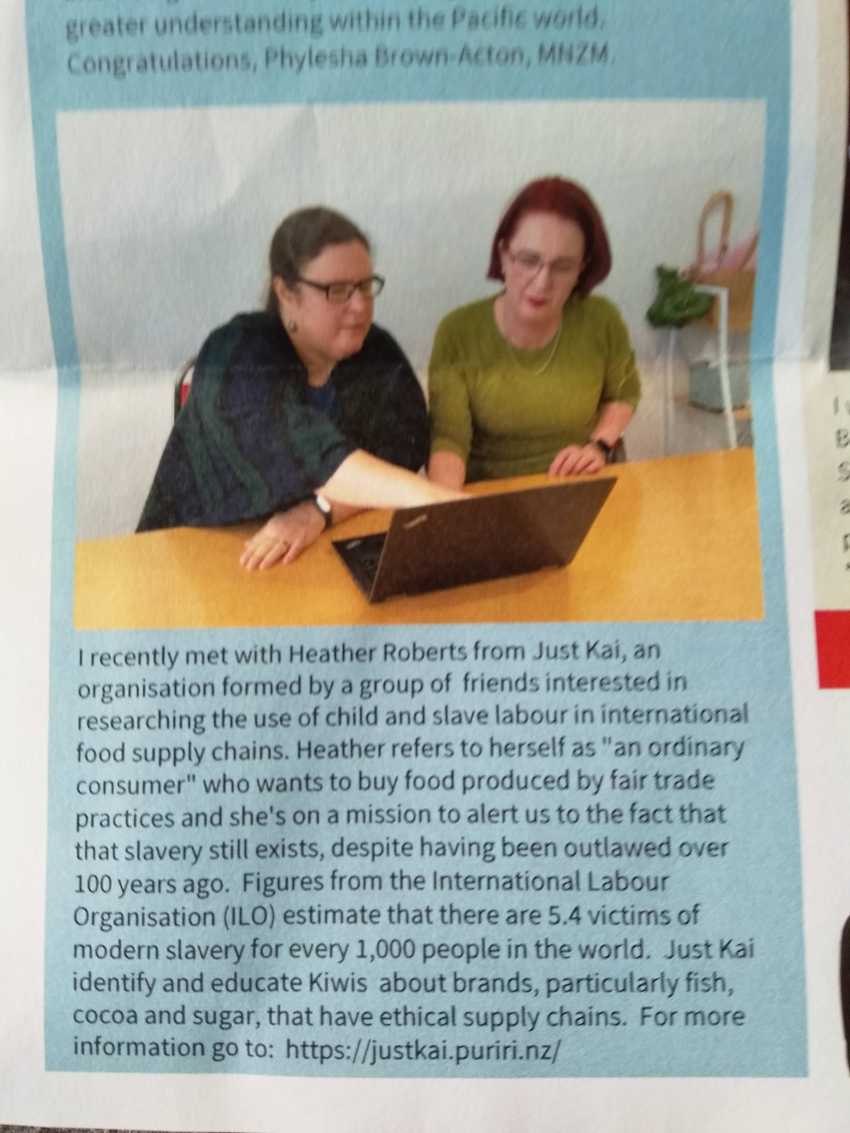I recently had the honour of speaking to my local MP, Deborah Russell, about why I believe New Zealand needs a Modern Slavery Act. This is legislation that would require large-ish companies trading in New Zealand to report annually on what they are doing to eliminate slave labour from their supply chains. The legislation wouldn’t actually require them to do anything about supply chain slavery, but it would require them to make a public statement telling everyone how much effort they were (or weren’t!) making in this area. Such legislation already exists in Australia, the UK, California (where it’s called ‘Transparency in Supply Chains’) and France (where it’s called ‘Duty of Vigilance’.
I got talking to Deborah about Just Kai when I bumped into her at a community event a few months back; in a follow-up email I mentioned how helpful I’d been finding Modern Slavery Act reports in my Just Kai research and said how much I’d like New Zealand to pass such a law. She invited me to come in and talk to her about it.

I was really encouraged by the meeting and am hopeful this is an issue Deborah will pursue. I’m sure she has many people urging her to take up a range of issues, but she did seem very interested and was already thinking through some of the practicalities of such legislation by the end of our meeting. She also featured our meeting and my work with Just Kai in her quarterly newsletter, Deborah’s Diary, in the Local Heroes section :-)

The case I made for a Modern Slavery Act for New Zealand was as follows (you can also read this as a one-page pdf summary here):
1. Slavery exists in the supply chains of things we buy
- There are around 40.3 million people are in slavery today. Of these:
- around 6.2 million are enslaved by private actors in the production of physical goods for sale (working in mining, manufacturing, trade, fisheries, agriculture etc.), some of which will be imported here.
- a further 4 million are enslaved by their governments. Some of these are also involved in producing goods for sale (e.g. people harvesting cotton in Central Asia).
- In terms of which sectors are most at risk, the goods imported by G20 countries at highest risk of slavery in their supply chain are, in order:
- electronics, garments, fish, cocoa, sugar (NZ is likely similar)
- In terms of prevalence and just focusing on fish, 3.1kg per tonne of seafood imported into the US is estimated to be produced with slave labour and 3.8kg per tonne of seafood imported into the US. The situation is likely to be at least as bad in New Zealand, as around 45% of our seafood imported for human consumption comes from Viet Nam and China and those are both countries at high risk of slavery in their fishing industries.
- New Zealand has both a moral obligation to do something about this and a legal one. We have committed to the Sustainable Development Goals and goal 8.7 states:
- “Take immediate and effective measures to eradicate forced labour, end modern slavery and human trafficking and secure the prohibition and elimination of the worst forms of child labour, including recruitment and use of child soldiers, and by 2025 end child labour in all its forms.”
2. Modern Slavery Act reports help me identify companies addressing this problem
Many pet food companies present in New Zealand are large multinationals that have to file Modern Slavery Act and/or Transparency in Supply Chains Act reports in either the UK or California. These reports have helped me identify slave-free pet food companies as follows:
- Some reports have been sufficiently detailed that I could decide whether or not I was confident that company had a slave-free supply chain simply based on the report without needing to contact them directly. This saved me a lot of time. Two examples:
- Hartz’s report described conducting audits (both announced and unannounced) throughout their supply chain and training their staff to recognise signs of modern slavery. This was sufficient for Just Kai to recommend them.
- In contrast Kraft Heinz (the parent company of Heinz Watties, makers of Chef, Champ, Nutri-Plus and Gourmet petfood) only described asking their suppliers to commit to not use forced or child labour (although they did reserve the right to either verify compliance themselves or ask the supplier to demonstrate compliance). Just Kai puts high value on audits (especially unannounced audits) so this was insufficient for us; we also wrote to Kraft Heinz to let them know our concerns.
- Some large companies (e.g. Mars and Nestle, both large pet-food manufacturers) have used their Modern Slavery Act reports as a sort of index for all the documents they produce on human welfare issues. This has made it easy to find documents on, for example, Mars’ policy on fishing in Thailand.
- Some companies provide insufficient detail in their reports for me to make an assessment on their petfood supply chain (often because they are large and complex companies and petfood is a small part of their business). However, the information they provide still helps me ask more targeted questions. For example, Colgate Palmolive (parent company of Hills petfood) states that, to date, they have audited “more than 75 percent of our spend with direct material suppliers operating in high-risk geographies”. Fish from Thailand in their Hills petfood is surely a raw material from a high-risk geography, so I was able to ask if that was in the 75% audited to date.
3. Modern Slavery Act reporting reduces slavery in supply chains
- Research by Development International into UK Modern Slavery Act reports1 has found that, of the FTSE100 companies that had filed their 2019 reports at the time of the study, 87% were doing more to prevent modern slavery than they had at the time of their 2018 report.
- Research from the International Corporate Accountability Roundtable1 found that businesses reporting on the risks of slavery in their supply chains devoted more resources to this problem over time.
- I don’t have data to back this up, but surely such legislation being passed also increases the public awareness of the issue, which itself will lead to more effort being made to solve it.